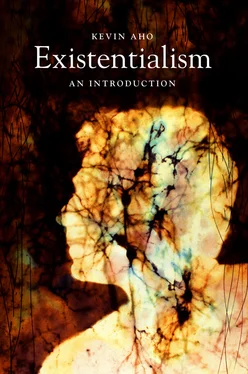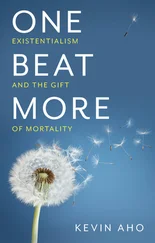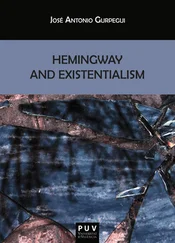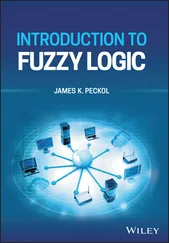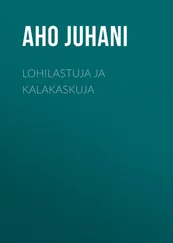To properly understand the existentialist view of freedom, we have to distinguish it from more traditional conceptions. First, existentialists generally reject the psychological notion of freedom as having something to do with an inner faculty, namely, the ‘mind’ or ‘will.’ This results in an overly mentalistic picture of human agency and uncritically assumes that we have transparent access to the inner dynamics of our own minds (Danto 1965, 116). In response, existentialists generally argue that much of what we take to be willful and self-conscious actions are actually unconscious . We are, in other words, largely unaware of our choices and actions because they are motivated by involuntary instincts and habituated ways of being-in-the-world. Nietzsche illuminates this point in The Gay Science :
We could think, feel, will, and remember, and we could also ‘act’ in every sense of the word, and yet none of all this would have to ‘enter our consciousness’ (as one says figuratively). All of life would be possible without seeing itself, as it were, in a mirror, and in fact, even in us now, by far the greatest part of life still plays itself out without this mirroring — yes even our thinking, feeling, willing life, as offensive as this may sound to an older philosophy. What is consciousness for in the first place, if on the whole it is superfluous ? (1995, 354)
Nietzsche's comments anticipate the views of twentieth-century figures like Heidegger and Merleau-Ponty by articulating the extent to which human beings are already acting in non-deliberate and pre-reflective ways, where conscious reflection plays only a small or derivative role in our everyday lives.
Second, existentialist freedom is not to be confused with ‘positive freedom’ or what Sartre in Being and Nothingness calls the freedom “to obtain what one has wished” (1956, 622). For the existentialists, if we can do whatever we want, then it turns out that we are not free at all; we are actually at the mercy of our wants, where we simply respond to passing whims and desires, moving in one direction or another based on whatever impulse is strongest. In The Brothers Karamazov , Dostoevsky describes such a conception of freedom in terms of a kind of self-destructive ‘bondage’:
The world has proclaimed the reign of freedom, especially of late, but what do we see in this freedom? Nothing but slavery and self-destruction! … Interpreting freedom as the multiplication and rapid satisfaction of desires, men distort their own natures, for many senseless and foolish desires and habits and ridiculous beliefs are thus fostered. … [How] can a man shake off his habits, what can become of him if he is in such bondage to the habit of satisfying the innumerable desires he has created for himself? (1957, 289)
For Dostoevsky, true freedom emerges only when we are freed from the bondage of our immediate desires and wants. When he claims that our capricious impulses “distort [our] own nature,” he is suggesting that we are being dishonest with ourselves by denying our uniquely human capacity for transcendence. Unlike infants and animals, we have the ability to surpass our brute needs and desires by taking a stand on them, interpreting them, and giving them meaning. Existentialist freedom, then, is best understood as freedom of “ intention ” (Solomon 1972, 280); it is our inescapable capacity to interpret the world, to give meaning and value to our situation on the basis of our own choosing. This is why Sartre says, “Every man who takes refuge behind the excuse of his passions … is a dishonest man” (2001, 305). Freedom is not a property that we may or may not have; it is an ontological or structural condition of being human. Thus, even when I choose not to choose and simply ‘go with the flow’ of my immediate desires, I am still making a choice by envisioning a certain kind of life, assigning meaning to a particular identity, and making myself who I am (Guignon 2004b, 497). “What is not possible,” says Sartre, “is not to choose. I can always choose, but I ought to know that if I do not choose, I am still choosing” (2001, 304).
Finally, existentialist freedom should not be regarded as a universal moral entity, the ultimate ‘value,’ ‘ideal,’ or ‘right’ that people struggle for, that politicians and religious leaders reify, and that needs to be preserved and protected against possible threats (Cooper 1999, 154). As a structure of being human, freedom cannot be preserved, diminished, or increased; it can only be accepted and faced as an existential given. And this acceptance is by no means a positive thing. Indeed, the sincere and clear-sighted acceptance of human freedom is usually accompanied by anguish and dread because we realize that we alone are responsible for the choices we make in our lives. There is no moral absolute, ethical calculus, or natural law that can justify our choices; there is no higher tribunal than the individual himself or herself. As Camus writes, “I continue to believe that this world has no higher meaning, but I know that something in it has meaning and that is man; for he is the one being to insist on having a meaning” (cited in Solomon 1972, 285). For the existentialists, then, the individual is always burdened with the “terrible freedom” of choosing his or her own meanings and values, and “there are no excuses behind us nor justifications before us” (Sartre 2001, 296). Even faith in God, as religious existentialists like Kierkegaard, Buber, Marcel, and Tillich make clear, is a terrifying choice, a ‘ mysterium tremendum ,’ because it is inexpressible to others and cannot be guided by any appeal to reason(Otto 1923, 12–23; Buber 1970, 127).
From the preceding discussion, it is easy to see how the existentialist conception of freedom conflicts with prevailing views of scientific materialism and determinism. The brand of determinism that triumphs today is shaped by the paradigm of Enlightenment science and, in this sense, is different from older versions of determinism or ‘fatalism’ characteristic of Antiquity and the Middle Ages. Fatalism is a view that is not especially concerned with identifying and explaining specific causal chains that result in particular outcomes. Sophocles (496–406 bc), for example, makes it clear that Oedipus was fated to kill his father and marry his mother regardless of whatever causal chain he pursued (Solomon 2002, 66). By contrast, scientific determinism is specifically concerned with identifying efficient causes that bring about particular effects in fixed, law-like ways. To this end, it follows the Newtonian formula that “all events can in principle be fully explained by previous events and the laws of nature” (Fischer 1994, 6). As we have shown, this view is a rejection of older teleological accounts that saw the universe as a meaningful cosmic order where each entity had a particular function or purpose. With the rise of modern science, the universe comes to be regarded as a meaningless aggregate of causally interacting physical bodies. And human beings, as part of this system, are subject to the same mechanistic laws as other bodies. We are reduced to physical organisms that are determined by natural forces.
The determinist thesis generally results in the view that there can be no such thing as free will because all movements, including human actions, are fully caused or determined by preceding events, where some of those events are internal to the individual and some are external. On this account, in any particular case we could not have acted otherwise than we did and therefore we cannot be held morally responsible for our actions. Existentialists, with the crucial exception of Nietzsche, whom we will discuss at the end of the chapter, reject the determinist thesis and affirm the view that the human being is a moral agent who has free will, who can make choices, and be held morally responsible for his or her actions. Any other position would strip away the dignity of being human, reducing us to mere automata or machines that are at the mercy of causal laws. As Sartre puts it:
Читать дальше
